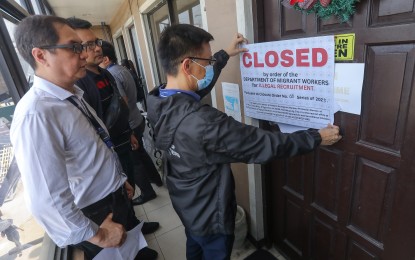
STOP OPERATIONS. The Department of Migrant Workers shuts down a consultancy services firm in Parañaque City for illegal recruitment on Sept. 7, 2023. Department of the Interior and Local Government Secretary Benjamin Abalos Jr. reminded local government officials on Monday (June 17, 2024), including village captains, to scrutinize documents of establishments applying for business permits. (PNA file photo by Yancy Lim)
MANILA – As the first line of defense in granting business permits, local government units must scrutinize documents of establishments, the Department of the Interior and Local Government (DILG) said Monday.
In a radio interview, DILG Secretary Benjamin Abalos Jr. said business process and licensing offices (BPLOs) and village officials must ensure that only those who do legitimate operations would be given business permits.
“They have that power dun sa mga negosyo, inisa-isa ‘yan at sa pinakababa mo (over those businesses, they should check every single business and at the bottom), you have the barangay captain kasi bago magbigay ng permit sa negosyo, of course dapat lahat ay nalalaman nila ang mga (before a business permit is granted, of course, they should be aware of all) activities," Abalos said.
The DILG chief said local officials who have reason to believe that a business is engaged in suspicious and illegal activities must coordinate with proper authorities.
The move came following the recent raid at an illegal Philippine Offshore Gaming Operator (POGO) in Porac, Pampanga, allegedly operating as a scam farm.
Authorities discovered computers, mobile phones, guns, ammunition and even alleged uniforms of the Chinese People's Liberation Army.
Some foreigners who were alleged victims of torture were rescued from the facility.
Abalos, meanwhile, directed LGUs and the Philippine National Police to be on the lookout for some 200 to 400 establishments whose applications to operate as POGOs were rejected by the Philippine Amusement and Gaming Corp. (PAGCOR).
"Kausap ko lang si (PAGCOR) chairman (Alejandro Tengco) 43 na lang, so 'yang 43 na sinasabi sa akin, halos linggo linggo tsine-check nila (In my talks with the PAGCOR chairman, there are only 43 licensed POGOs here, so those 43 are undergoing weekly checks)," Abalos said.
“So you could just imagine, ‘yung hindi mo napagbigyan ng permit, nasa Pilipinas pa ‘yung iba dyan at malamang na gumagawa ng (those who were not given permits might be still here in the Philippines and some of them are likely to be involved in) illegal activities,” he added.
The Presidential Anti-Organized Crime Commission earlier urged LGUs to report suspected illegal POGO hubs and scam farms in their areas.
Ban POGOs now
A prelate also believes it is high time for the government to prohibit POGOs in the country due to the social ills these have caused.
“Stop the POGOs! It is time to end the regime of Philippine Off-Shore Gaming Operators! Whatever benefits that allow them to operate may have been promised are overshadowed completely by the threat they carry with them and in fact, the dreadful harm of their presence,” Lingayen-Dagupan Archbishop Socrates Villegas said in a pastoral letter.
Aside from scam activities, the prelate said POGOs have been linked to crimes such as kidnapping, human trafficking, and murder.
“The recent raids that revealed the extent of the evil at these POGO hubs including incidences of human trafficking and torture and money laundering make it a moral imperative that no longer should they be granted the protection of the law and that they, in fact, should be outlawed,” Villegas added. (with Ferdinand Patinio/PNA)
